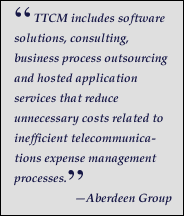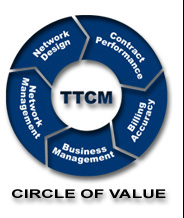




TTCM Savings Area:
Contract Performance
Published In: Volume
3 Issue 7
Date: December,
2004
|
This is the first in a series on developing and issuing quality telecom RFPs. Future topics will include RFP content requirements and grading schema. Why is it that RFPs have such a bad reputation? It's not just because only one team can win and the rest have to lose. That's basic competition, and most companies are willing to accept that risk. More likely its because RFPs are often executed poorly, leaving the participants frustrated over the lack of clearly defined opportunity. This doesn't have to be the case, however. An RFP can, and should, be your ticket to lowest costs, strongest vendor relationships, and greatest future flexibility. Here's a clear set of guidelines to help you get it done right.
Integrity is a word that gets thrown around a lot, but if you believe in the integrity of your firm and your team, you have an obligation to treat the participating vendors with respect. Make sure they know the rules of engagement and then follow them to the hilt. Don't let a vendor create your RFP for you, the good competitors will spot the built-in bias a mile away. Confidentiality is paramount, you have to respect theirs if you expect them to respect yours (but get that Confidentiality Agreement signed first!).
The success of the RFP is based upon executing it by the rules. It's obvious that some bidders will stop at nothing to gain any advantage they can. You must insure that your team and anyone else in your firm that is associated with the RFP follows the program exactly. Start by limiting points of contact between vendors and your firm to control the flow of information that might compromise your process. Document all conversations and bidder conferences, and make any revisions or answers to questions available to all bidders.
For the RFP to succeed, two elements of timeliness are required. First, you have to be in a position to actually change your services from the incumbent to a new vendor. Second, you have to begin the process with enough time to complete the job in a way that is most advantageous to your firm. Make sure your schedule allows you time to apply leverage throughout the process and not get backed against the wall.
Vendors can't provide meaningful responses if they don't understand your needs. RFPs for telecom services that do not that clearly indicate the required technologies, locations, volumes, etc. are meaningless. This will require some serious pre-RFP effort on your part, but the results will be well worth the effort.
An RFP isn't an exercise in seeing how many hoops you can make the vendor jump through, or how much information you can collect. It's sole purpose is to help you lower your costs while improving your services, so keep the RFP sharply focused on what matters. This isn't an essay contest, feel free to use the same red marker an editor does when trimming the fat on a first novelist. Vendors truly appreciate, and will provide superior responses, when the RFP stays on track and doesn't ramble.
Unless the RFP causes the respondents to provide very specific responses to highly defined questions, you will have the proverbial comparison between apples and oranges. Build the RFP in such a way that the vendors must all present identical sets of information, with the values they assign being the only differences.
You will assign multiple criteria to your grading system. Price will always be a part, but there is much, much more. You will likely also look at experience, technical qualifications, third party solutions, SLAs, and remedies. You must have the grading criteria built in advance so that all parties will score the responses the same way. You should never tell the vendors your weighting of the scoring criteria, however.
The purpose of the RFP is to connect you with the vendor that best meets your needs so your goal is to get each respondent into the most highly competitive position possible. You can do this by insisting that you will negotiate with any and all vendors, at your discretion, until a contract is signed. This eliminates the concept of a "favored" vendor. Also, you should let each vendor know that you reserve the right to terminate the RFP process and award the contract at any time. This lets them know that "weak" first offers could eliminate them quickly, and that their best current offer needs to always be on the table.
We've all heard that "It ain't over 'til the lady sings", and with RFPs this is most definitely true. Experience has shown that when the process moves from evaluating the RFP into a negotiation, unexpected changes and costs have a way of sneaking in. Never allow the vendor to believe they have been "selected" until you have the signed contract. Even if they are getting 98% of your attention at this point it must be crystal clear that there are competitors still in the game and the process is still open to all. This keeps the negotiating leverage where it belongs, in your camp.
All RFPs come to the end of the line. There will be a "winner" and several "losers". Continue to show respect for the vendors you did not select by providing them with a cordial and thoughtful closing response. How much you choose to share about your choice is up to you, but all will appreciate an understanding of why they were not able to win your business. Your brief commitment of time to fulfill this aspect is very small compared with the time and effort they put into the overall process.
©2004,
TelAssess, Inc. All rights reserved. |
![]()
©2004, TelAssess 800.657.1595
Designed by Stylus
Designs
